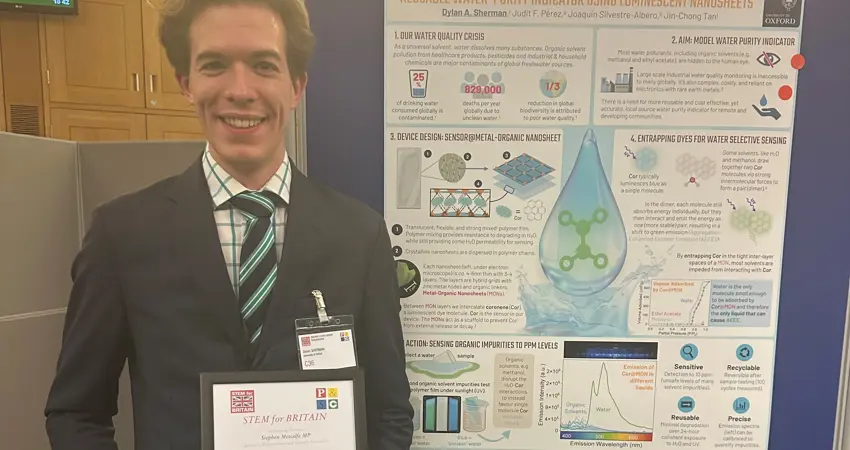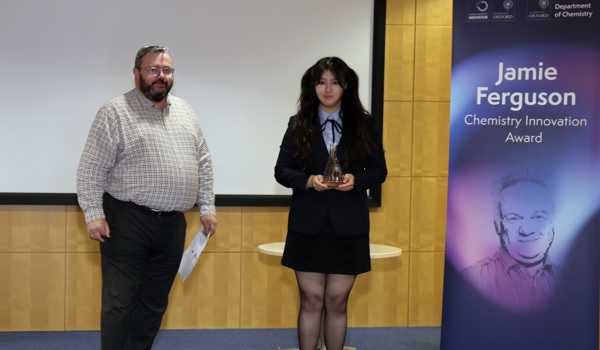08 Mar 2023
Engineering DPhil student wins Silver Medal at STEM for BRITAIN 2023
Dylan Sherman won the Silver medal in the Chemistry category for his poster presentation on creating a re-usable, cost-effective, and accurate local source water purity indicator for remote and developing communities

Dylan Sherman at the STEM for Britain reception event
The event, which was hosted on 6 March on the Parliamentary estate, is a major scientific poster competition and exhibition organised by the Parliamentary & Scientific Committee and judged by professional and academic experts. It aims to recognise the outstanding science and engineering research being undertaken in UK universities by early-career researchers by giving them the opportunity to present their work directly to Members of Parliament (MPs).
This year, seven Oxford early-career researchers were short-listed and three were awarded gold, silver and bronze medals for their work. Applications were open to scientists, engineers, technologists and mathematicians under five subject categories: Biological and Biomedical Sciences, Physics, Engineering, Mathematical Sciences and Chemistry.
Dylan Sherman, third-year Engineering Science DPhil student (Trinity College), won the Silver medal in the Chemistry category for his poster presentation on creating a re-usable, cost-effective, and accurate local source water purity indicator for remote and developing communities.
He says, “With water quality challenges globally, there is a pressing need for easy to use, reliable water purity indicators for those that rely on local point water sources in remote communities. We’ve tackled this challenge by developing a portable cost-effective luminescent indicator that uses porous nano materials to identify hazardous organic solvent pollutants. The device is a composite, appearing as a polymer strip. Within the polymer strands, we disperse nanometre thin 2D Metal-Organic Nanosheets that contain the sensor, a luminescent guest. By confining the guest, we found the molecule emits green when in the presence of pure water, but blue when there is a ppm presence of organic solvents. This provides a vivid indication of hazardous contaminants like methanol, toluene or ethyl acetate. Next, we are looking to integrate purification into the device - creating an all-in-one system for sensing and cleaning organic solvents in water samples.”
120 shortlisted finalists were invited to the reception event at UK Parliament to present a scientific poster. Reflecting on the event, Dylan says, "It was an electric atmosphere, stimulated by the nexus between politicians, industry, professional organisations and academics. Even better, the poster format meant the connection between sectors was real - easily enabling powerful one-to-one discussions with parliamentarians and professionals directly. Sharing my research with the broader community was an exciting challenge of simplification and relatability - distilling the work to what really matters for our society. Thank you to all involved for the opportunity!" Dylan is supervised by Professor Jin-Chong Tan in the Multifunctional Materials & Composites Lab.
Stephen Metcalfe MP, Chair of the Parliamentary & Scientific Committee, said, "These early career engineers, mathematicians and scientists are the architects of our future and STEM for BRITAIN is politicians’ best opportunity to meet them and understand their work. Given the volume of applications each year, just to have a poster in this final is an achievement."
The other Oxford University finalists presented posters on the following subjects:
- The application of atom probe tomography to investigate how ultrathin nanolayers could help develop improve the power conversion efficiency of solar panels (Ruy Sebastian Bonilla, Department of Materials)
- A bespoke molecular flow sensing device to aid the early detection of lung abnormalities in young smokers (Jennifer Redmond, DPhil in Physical and Theoretical Chemistry).
- Microscale soft power sources for bio-integrated devices that can stimulate cells and tissues (Yujia Zhang, postdoctoral researcher, Department of Chemistry).
You can find more information about the competition and view all the finalists’ posters on the STEM for BRITAIN website.




